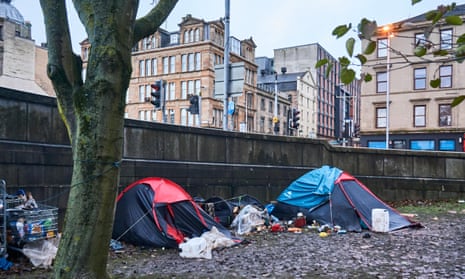Shelter Scotland is to launch a significant court action against Glasgow city council, with the charity claiming it has illegally denied temporary accommodation to homeless applicants thousands of times over the past two years.
In a legal action that could have consequences for local authorities across Scotland, the housing and homelessness charity is on Wednesday seeking a judicial review of the council’s actions after its own figures revealed that 3,365 applications for temporary accommodation had not been fulfilled in the year up to March 2019, compared with 3,055 over the previous 12 months.
In 2001 the Scottish parliament passed legislation that was considered groundbreaking at the time, requiring councils to provide a minimum of temporary accommodation, advice and assistance to all applicants assessed as being homeless.
Despite the council calling on Shelter Scotland to work with partners in the city rather than launching legal action, the charity will ask the court of session in Edinburgh to declare the council’s failure to provide accommodation unlawful. It is also calling for the court to order an overall strategy review by Glasgow city council that puts a plan in place to guarantee temporary accommodation for every homeless person that needs it and which will be submitted to the Scottish government.
Shelter Scotland’s director, Graeme Brown, said it was not entering into legal action lightly, but said it had been raising concerns about the council’s gatekeeping – preventing homeless people from accessing the services they are legally entitled to - for at least five years.
“We have attempted to engage with the city council over a five-year period, under different political administrations, but the fact they have not responded to our letter [sent in August, warning of the pending legal action] or our solicitors speaks volumes.”
The city council’s homelessness services have come under particular pressure recently with an HIV epidemic and drug-related deaths significantly affecting Glasgow’s homeless population, as well as draw of Scotland’s largest local authority for those who find themselves in difficulties in more rural areas. However, Brown insisted the crisis was not a result of sudden pressures but systemic failures.
“Glasgow city council is consistently failing to meet its legal duty, with large numbers of people not getting the services they have a legitimate right to expect,” he said, adding: “It is often claimed that Scotland has very progressive homelessness legislation but rights only have value if they are acted upon. What we don’t need is more high level plans but to ensure the enforcement and delivery of services.”
A Glasgow city council spokesman said: “Glasgow faces significant – and in a Scottish context, perhaps unique – pressures on our homelessness accommodation, and we continue to work with the Scottish housing regulator and partners in the housing and third sectors to help those facing homelessness and the threat of homelessness.
“We share a common aim with Shelter and, rather than focusing on court action, we would hope it could work together with the council and its partners to ensure that these challenges are met.”
